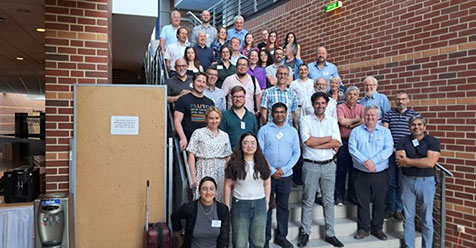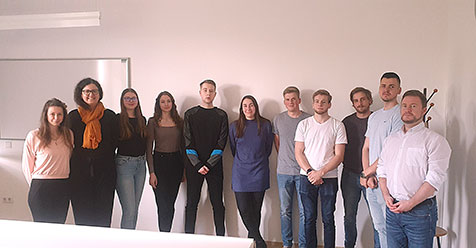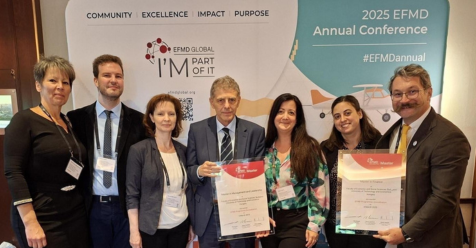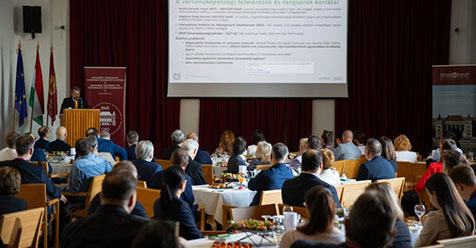Historic success at the BME GTK: EFMD accreditation for two Master’s programmes
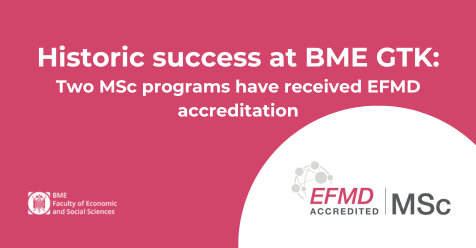
The Faculty of Economic and Social Sciences (GTK) of the Budapest University of Technology and Economics (BME) has achieved an outstanding success: the prestigious international European Foundation for Management Development (EFMD) accreditation body has simultaneously accredited two of the Faculty’s English-language master training programmes. The English-language Master’s programmes in Management and Leadership and Finance have been awarded one of the most prestigious international accreditations in management and business higher education, thereby allowing the BME GTK to join the community of EFMD accredited institutions.
This accreditation guarantees that students will receive a quality education that meets the expectations of the global business world, so they can build their careers with more confidence. Completing these training programmes increases our students’ prospects in the international labour market and makes them more attractive to potential employers, who know that graduates from accredited training programmes possess knowledge and skills that can only be acquired at top institutions.
The EFMD is one of the most influential international quality assurance organisations in management and business higher education, with 951 member institutions worldwide, including 725 business schools. The EFMD accreditation is a guarantee for the highest level of quality and innovation, which significantly increases the international recognition and competitiveness of its member institutions. The organisation’s mission is to promote the development of management education and to provide a forum for professional collaboration, research and sharing best practices.
An interview with Dean of the GTK Prof. Tamás Koltai, and Vice Dean for International Affairs Dr. Mária Szalmáné Csete.
What exactly is the EFMD accreditation and why is it important for the BME GTK?

Prof. Tamás Koltai: The EFMD accreditation is a comprehensive, international quality assurance framework that evaluates higher education institutions and programmes in management and business against rigorous standards. For the BME GTK, this accreditation is of strategic importance because an independent body certifies that the Faculty’s educational processes and curricula meet the standards of top internationally business training programmes. This recognition enhances the prestige and attractiveness of our programmes in the global and Hungarian education markets, thereby increasing the competitiveness of both the Faculty and the University. Obtaining the EFMD accreditation is a key element of the internationalisation objectives of the BME GTK, and is a serious professional feedback on the quality of the Faculty’s development processes in recent years. The accreditation not only certifies the high quality of the relevant master’s programmes, but also indirectly attests to the quality of the entire faculty’s teaching portfolio of 6 Bachelor’s programmes and 11 Master’s programmes through a comprehensive assessment of faculty processes and systems.
Dr. Mária Szalmáné Csete: This international accreditation is a guarantee for the highest level of quality and innovation, which continuously increases the international recognition of the institution. The assessment covered the Faculty’s teaching activities, research performance, network of international relations, ethics, responsibility and sustainability (ERS) and corporate relations. As the leader of the Faculty’s EFMD project, I can confirm that the accreditation process is not just a one-off audit but a continuous evolution cycle that supports the implementation of the Faculty’s strategic objectives in line with the GTK’s Mission Statement. Currently, the EFMD organisation includes 112 EFMD-accredited institutions worldwide, and there are around 80 EFMD-accredited Master’s and MBA training programmes, of which more than 60 are located in Europe. The BME GTK is the first in Hungary to have two English-language Master’s programmes accredited, and the EFMD accreditation of the Master in Finance programme is unique in Hungary. There are only two Master in Management and Leadership and eight Master in Finance training programmes with EFMD accreditation worldwide, which also reflects the GTK’s international recognition and the quality of its training programmes.
What are the steps of the accreditation process? What criteria did the EFMD Peer Review Team (PRT) assess the GTK and the two English-language Master’s programmes?

Dr. Mária Szalmáné Csete: The first phase of the two-step process was to confirm that the two Master’s programmes were suitable for the accreditation process, i.e. that they met all the necessary conditions and requirements. In September 2023, based on the faculty documents submitted, the relevant EFMD Programme Accreditation Board found both Master’s programmes suitable for participation in the accreditation process. In the second phase, the EFMD required us to prepare a self-assessment report and develop a robust database, which in late November 2024 was followed by a visit of a four-member international accreditation Peer Review Team (PRT) to review our programmes and educational processes on site. The second phase lasted for over a year (institutions have a maximum of 2 years to complete this phase), with over 100 faculty members involved in the preparation of materials and the interviews conducted by the EFMD Peer Review Team (PRT). Members of the international Peer Review Team spent several days at the GTK, where they interviewed current and alumni students, lecturers, faculty members responsible for teaching and administrative processes, business partners and heads of the Faculty and the respective departments. The assessment focused on the quality of education, research activities, internationalisation, business partnerships and governance. In its report based on the available data and databases as well as the interview responses, the EFMD Peer Review Team summarized its findings and made a recommendation to the EFMD Programme Accreditation Board, which unanimously supported the accreditation of both English-language Master’s programmes of the Faculty in its resolution on 4 March 2025.
What type of feedback have you received from the EFMD Peer Review Team and how can this help the Faculty’s further development?
Prof. Tamás Koltai: The Peer Review Team gave positive feedback about the Faculty’s work and current processes, and made useful suggestions for further improvements. The feedback of the Peer Review Team (PRT) also confirmed that the BME GTK is a student-friendly faculty. They based this conclusion on their interviews with alumni students, business partners and lecturers. Their assessment highlighted, among other things, the high professional quality of the master theses. A more intensive involvement of the GTK’s business partners in education (e.g. corporate case studies, project assignments, Intensive Seminar) and a more institutionalised support from the already strong corporate sponsor base could further strengthen the link of our programme with the business community. The report also highlighted the GTK’s up-to-date work in ERS (Ethics, Responsibility, Sustainability), the Green Certificate system as well as the usefulness of the transversal skills taught in the Intensive Seminar. From the BME’s point of view, it is of particular value that the main strength of the Master’s programme in Management and Leadership was found to be the focus on production and operations management, which distinguishes the programme from its competitors and is a key factor of competitiveness. The accreditation process clearly identified further directions for improvement and we have received strong positive feedback that we have always been on the right track to meet international standards.
What further steps do you plan to take in terms of Faculty’s internationalisation?
Dr. Mária Szalmáné Csete: The GTK attaches great importance to cooperation with its business partners, and its long-term objectives include expanding its partner network, further strengthening existing partnerships, developing new joint projects and involving more business professionals in even more phases of the educational process. We also aim to improve cooperation with our business partners, and to operate professional relations in a more organised way, which will bring many benefits to all concerned. This accreditation is not just a one-off recognition, but an evolutionary process aimed at continuously improving the quality of education. The GTK remains committed to internationalisation, with a number of objectives set out in the 2024 GTK Internationalisation Strategy.
I would like to take this opportunity to thank the current and alumni students, the lecturers and admin (non-teaching) colleagues of the GTK, our business partners and Vice Dean Dr. Mária Szalma, née Csete, for their work, without whom this success would not have been possible. It is this collective effort, the commitment of our students and the high quality work of our lecturers that enabled us to win this prestigious recognition. EFMD-accredited diplomas are recognised and sought after by international companies and institutions. One of the key objectives of the BME GTK’s strategy is to keep its business training programmes in the top tier of international management education and to provide our students with the highest quality education.
Prof. Tamás Koltai added.
